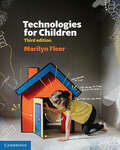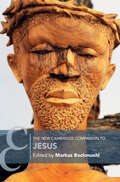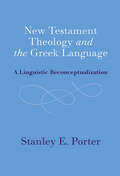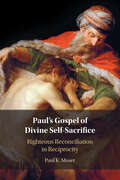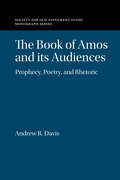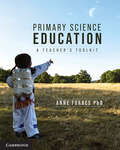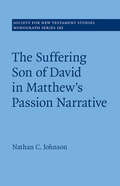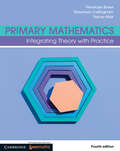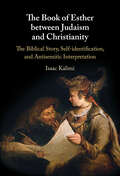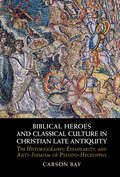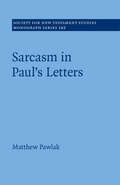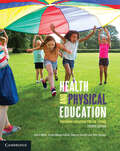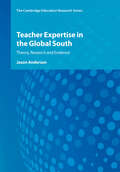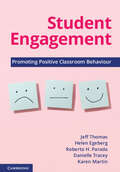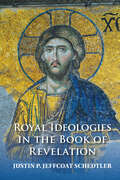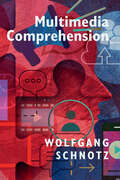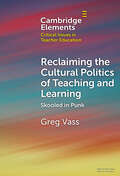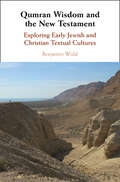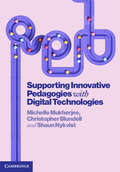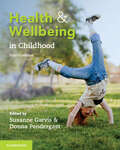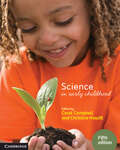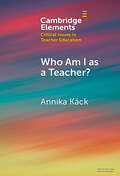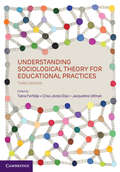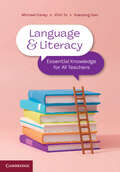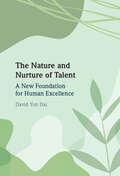- Table View
- List View
Technologies for Children
by Marilyn FleerTechnologies for Children is a comprehensive guide to teaching design and digital technologies to children from birth to 12 years. Aligned with the Early Years Learning Framework and the Australian Curriculum: Technologies, this book provides practical ideas for teaching infants, toddlers, pre-schoolers and primary-aged children. The third edition includes expanded content on teaching digital technologies, with a new chapter on computational thinking. Key topics covered include food and fibre production, engineering principles and systems, and computational thinking. The content goes beyond discussing the curriculum to consider technology pedagogies, planning, assessment and evaluation. Case studies drawn from Australian primary classrooms and early childhood centres demonstrate the transition from theory to practice. Each chapter is supported by pedagogical reflections, research activities and spotlights, as well as extensive online student resources. Written by Marilyn Fleer, this book presents innovative, engaging and student-centred approaches to integrating technologies in the classroom.
The New Cambridge Companion to Jesus (Cambridge Companions to Religion)
by Markus BockmuehlThe New Cambridge Companion to Jesus serves as the most up to date guide and resource for understanding Jesus' multifaceted legacy, enduring impact over time and space, and relevance in today's world. Integrating textual, historical, theological, and cultural perspectives, the essays, specially commissioned for this volume, also offer a fresh and diverse overview of Jesus' significance in contemporary global contexts. Key features include insights into Jesus' life and teachings, his role in different religious traditions, and his influence on art, music, and global cultures. The volume also addresses contemporary issues of poverty, race, and power dynamics, making it especially relevant for today's readers. The Companion offers a diversity of perspectives from which to approach the unique identity and importance of Jesus beyond the 2020s, whether in relation to Christianity's cultural and existential crises in the Americas, its precipitous decline in Western Europe, or its unprecedented growth and proliferation in Africa and Asia.
New Testament Theology and the Greek Language: A Linguistic Reconceptualization
by Stanley E. PorterIn this book, Stanley E. Porter offers a unique, language-based critique of New Testament theology by comparing it to the development of language study from the Enlightenment to the present. Tracing the histories of two disciplines that are rarely considered together, Porter shows how the study of New Testament theology has followed outmoded conceptual models from previous eras of intellectual discussion. He reconceptualizes the study of New Testament theology via methods that are based upon the categories of modern linguistics, and demonstrates how they have already been applied to New Testament Greek studies. Porter also develops a workable linguistic model that can be applied to other areas of New Testament research. Opening New Testament Greek linguistics to a wider audience, his volume offers numerous examples of the productivity of this linguistic model, especially in his chapter devoted to the case study of the Son of Man.
Paul's Gospel of Divine Self-Sacrifice: Righteous Reconciliation in Reciprocity
by Paul MoserIn this book, Paul Moser explains how self-sacrificial righteousness of a reparative kind is at the heart of Paul's gospel of God. He also shows how divine self-sacrifice authenticates that gospel via human reciprocity toward God in reconciliation. A basis for this reciprocity lies in a teaching of ancient Judaism that humans are to reciprocate toward God for the sake of an interpersonal relationship that is righteous and reconciled through voluntary self-sacrifice to God. Moser demonstrates that Paul's gospel calls for faith, including trust, in God as reciprocity in human self-sacrifice toward God. Although widely neglected by interpreters, this theme brings moral and evidential depth to Paul's good news of reparative redemption from God. Moser's study thus enables a new understanding of some of the controversial matters regarding Paul's message in a way that highlights the coherence and profundity of his message.
The Book of Amos and its Audiences: Prophecy, Poetry, and Rhetoric (Society for Old Testament Study Monographs)
by Andrew R. DavisMany studies of the prophetic books assume that a text's addressee and audience are one and the same. Sometimes this is the case, but some prophetic texts feature multiple addressees who cannot be collapsed into a single setting. In this book Andrew R. Davis examines examples of multiple addressees within the book of Amos and argues that they force us to expand our understanding of prophetic audiences. Drawing insight from studies of poetic address in other disciplines, Davis distinguishes between the addressee within the text and the actual audience outside the text. He combines in-depth poetic analysis with historical inquiry and shows the ways that the prophetic discourse of the book of Amos is triangulated among multiple audiences.
Primary Science Education: A Teacher's Toolkit
by Anne ForbesPrimary Science Education: A Teacher's Toolkit is an accessible and comprehensive guide to primary school science education and its effective practice in the classroom. Primary Science Education is structured in two parts: Planning for Science and Primary Science in the Classroom. Each chapter covers fundamental topics, such as: curriculum requirements (including the Australian Curriculum and Australian Professional Standards for Teachers); preparing effective learning sequences with embedded authentic assessment; combining science learning with other learning areas, such as technologies and STEM; and critically analysing the teacher's role in the classroom. The text features short-answer and 'Bringing it Together' questions to encourage readers to consolidate their understanding of key themes. Case studies throughout provide guidance on the classroom experience and Teacher Background Information boxes explore topics where more in-depth knowledge is required. The book is supported by a suite of online resources, including interviews with Australian primary teachers and students, and downloadable activities.
The Suffering Son of David in Matthew's Passion Narrative (Society for New Testament Studies Monograph Series #183)
by Nathan C. JohnsonIn this book, Nathan C. Johnson offers the first full-scale study of David traditions in the Gospel of Matthew's story of Jesus's death. He offers a solution to the tension between Matthew's assertion that Jesus is the Davidic messiah and his humiliating death. To convince readers of his claim that Jesus was the Davidic messiah, Matthew would have to bridge the gap between messianic status and disgraceful execution. Johnson's proposed solution to this conundrum is widely overlooked yet refreshingly simple. He shows how Matthew makes his case for Jesus as the Davidic messiah in the passion narrative by alluding to texts in which David, too, suffered. Matthew thereby participates in a common intertextual, Jewish approach to messianism. Indeed, by alluding to suffering David texts, Matthew attempts to turn the tables of the problem of a crucified messiah by portraying Jesus as the Davidic messiah not despite, but because of his suffering.
Primary Mathematics: Integrating Theory with Practice
by Tracey Muir Rosemary Callingham Penelope BakerPrimary Mathematics: Integrating Theory with Practice is a comprehensive introduction to teaching mathematics in Australian primary schools. Closely aligned with the Australian Curriculum, it provides a thorough understanding of measurement, geometry, patterns and algebra, data and statistics, and chance and probability. The fourth edition provides support for educators in key aspects of teaching: planning, assessment, digital technologies, diversity in the classroom and integrating mathematics content with other learning areas. It also features a new chapter on the role of education support in the mathematics classroom. Each chapter has been thoroughly revised and is complemented by classroom snapshots demonstrating practical application of theories, activities to further understanding and reflection questions to guide learning. New in this edition are 'Concepts to consider', which provide a guided explanation and further discussion of key concepts to support pre- and in-service teachers' learning and teaching of the fundamentals of mathematics.
The Book of Esther between Judaism and Christianity
by Isaac KalimiThe book of Esther is one of the most challenging books in the Hebrew Bible/Old Testament, not only because of the difficulty of understanding the book itself in its time, place, and literary contexts, but also for the long and tortuous history of interpretation it has generated in both Jewish and Christian traditions. In this volume, Isaac Kalimi addresses both issues. He situates 'traditional' literary, textual, theological, and historical-critical discussion of Esther alongside comparative Jewish and Christian interpretive histories, showing how the former serves the latter. Kalimi also demonstrates how the various interpretations of the Book of Esther have had an impact on its reception history, as well as on Jewish-Christian relations. Based on meticulous and comprehensive analysis of all available sources, Kalimi's volume fills a gap in biblical, Jewish, and Christian studies and also shows how and why the Book of Esther became one of the central books of Judaism and one of the most neglected books in Christianity.
Biblical Heroes and Classical Culture in Christian Late Antiquity: The Historiography, Exemplarity, and Anti-Judaism of Pseudo-Hegesippus
by Carson BayIn this volume, Carson Bay focuses on an important but neglected work of Late Antiquity: Pseudo-Hegesippus' On the Destruction of Jerusalem (De Excidio Hierosolymitano), a Latin history of later Second Temple Judaism written during the fourth century CE. Bay explores the presence of so many Old Testament figures in a work that recounts the Roman-Jewish War (66–73 CE) and the destruction of Jerusalem in 70 CE. By applying the lens of Roman exemplarity to Pseudo-Hegesippus, he elucidates new facets of Biblical reception, history-writing, and anti-Judaism in a text from the formative first century of Christian Empire. The author also offers new insights into the Christian historiographical imagination and how Biblical heroes and Classical culture helped Christians to write anti-Jewish history. Revealing novel aspects of the influence of the Classical literary tradition on early Christian texts, this book also newly questions the age-old distinction between the Christian and the Classical (or 'pagan') in the ancient Mediterranean world.
Sarcasm in Paul’s Letters (Society for New Testament Studies Monograph Series)
by Matthew PawlakIn this book, Matthew Pawlak offers the first treatment of sarcasm in New Testament studies. He provides an extensive analysis of sarcastic passages across the undisputed letters of Paul, showing where Paul is sarcastic, and how his sarcasm affects our understanding of his rhetoric and relationships with the Early Christian congregations in Galatia, Rome, and Corinth. Pawlak's identification of sarcasm is supported by a dataset of 400 examples drawn from a broad range of ancient texts, including major case studies on Septuagint Job, the prophets, and Lucian of Samosata. These data enable the determination of the typical linguistic signals of sarcasm in ancient Greek, as well as its rhetorical functions. Pawlak also addresses several ongoing discussions in Pauline scholarship. His volume advances our understanding of the abrupt opening of Galatians, diatribe and Paul's hypothetical interlocutor in Romans, the 'Corinthian slogans' of First Corinthians, and the 'fool's speech' found within Second Corinthians 10-13.
Health and Physical Education: Preparing Educators for the Future
by Judith Miller John Haynes Susan Wilson-Gahan Robyne GarrettHealth and Physical Education provides readers with the knowledge, understanding and skills required to successfully teach health and physical education in Australia. With emphasis on the development of movement competence and health literacy from the early years to secondary, this book brings together research, theory, curriculum and pedagogy in an engaging introduction for pre-service teachers. Now in its fourth edition, Health and Physical Education has been thoroughly updated, and features a new chapter covering ethics, morals the and duty of care and their practical application in school health and physical education. Maintaining strong connections to learners of all ages, the text links closely to the Early Years Learning Framework and the recently updated Australian Curriculum: Health and Physical Education. Each chapter is framed by the five propositions of the Australian Curriculum: Health and Physical Education, and includes vignettes, activities and discussion and review questions to encourage reflection and group work.
Teacher Expertise in the Global South: Theory, Research and Evidence (Cambridge Education Research)
by Jason AndersonThere are many expert teachers working in the global South and we can learn a great deal from them. Neither of these claims should be surprising, yet to date there has been almost no research conducted on expert teachers working in Southern contexts. Instead, the huge sums of money invested in attempting to improve teacher quality in the South have frequently been directed towards introducing exogenous practices or interventions that may be culturally inappropriate, practically infeasible and ultimately unsustainable – often failing as a result. In this pioneering book, Jason Anderson provides an authoritative overview of the practices, cognition and professionalism of expert teachers working in low-income contexts. By drawing upon both systematic reviews of teacher expertise and effectiveness research, and his own fieldwork in India, he argues that without an understanding of expert teachers working in all contexts worldwide, we cannot truly understand expertise itself.
Student Engagement: Promoting Positive Classroom Behaviour
by Jeffrey Thomas Helen Egeberg Roberto H. Parada Danielle Tracey Karen MartinStudent Engagement: Promoting Positive Classroom Behaviour encourages pre-service teachers in Australian primary and secondary schools to make choices about how best to design and manage their classrooms and schools to maximise productive behaviour and learning. The text explores numerous dimensions of student engagement from within and outside school settings, including verbal and non-verbal communication; disengaged behaviours and corrective strategies; trauma-informed practice; working with students with emotional and behavioural disorders; and bullying prevention and intervention strategies. Linking to the Australian Professional Standards for Teachers (APSTs), each chapter includes 'Embedding the theory' and 'Story from the field' boxes that discuss the theoretical research behind different approaches to engagement and explore their practical applications. 'Making professional decisions' boxes at the end of each chapter also provide further guidance on how to approach different situations and build a repertoire of resources for practice.
Royal Ideologies in the Book of Revelation
by Justin P. Jeffcoat SchedtlerStudies of the Apocalypse have long neglected the royal and messianic dimensions of its portrait of the Lamb. In this volume, Justin P. Jeffcoat Schedtler offers new insights on this topic, arguing that royal and messianic ideologies and discourses are not merely evident in the book of Revelation but also constitute one of its primary organizing principles. Moreover, they shape Revelation's Christology. Schedtler explores ideologies of kingship in the ancient Greek and Roman world, as well as Second Temple Judaism. Making previously unexplored connections in Revelations' ideological portrait of the Lamb, he shows that the portrayal of Jesus as God's chosen viceregent, offers new insights into several of the central Christological tenets in the text. They include the Lamb's reception of the scroll to rule on God's behalf, his place on a heavenly throne, the many benefactions he offers to those who remain faithful to him, and the hymnic praise he receives in response.
Multimedia Comprehension
by Wolfgang SchnotzMultimedia messages use combinations of texts, pictures, maps, and graphs as tools for communication. This book provides a synthesis of theory and research about how people comprehend multimedia. It adopts the perspectives of cognitive psychology, semiotics, anthropology, linguistics, education, and art. Its central idea is that information displays can be categorized into two different but complementary forms of representations, which service different purposes in human cognition and communication. Specific interaction between these representations enhances comprehension, thinking, and problem solving, as illustrated by numerous examples. Multimedia Comprehension is written for a broad audience with no special prior knowledge. It is of interest to everyone trying to understand how people comprehend multimedia, from scholars and students in psychology, communication, and education, to web- and interface-designers and instructors.
Reclaiming the Cultural Politics of Teaching and Learning: Skooled in Punk (Elements in Critical Issues in Teacher Education)
by Greg VassDespite often being associated with anti-establishment, irreverent, and a do-it yourself (DIY) rejection of dominant culture, less considered may the collaborative, communal and curative threads of punk thinking, being and doing. From the outset, punk offered critiques and alternative ways of conceptualizing a world and ways of worlding, that aren't as harmful and constraining as those encountered by many in the dominant milieu of life. This monograph is focused on how and why punk can productively contribute to efforts that are responding to the influences of dominant culture in education, such as the effects of standardization, heightened accountabilities, and 'gap talk'. For this Element, punk can be thought of as social practices that generate cultural resources that can be utilized to critique dominant culture. Hence, this Element aims to make the case that punk sensibilities offer educators opportunities to reclaim the cultural politics of teaching and learning.
Qumran Wisdom and the New Testament: Exploring Early Jewish and Christian Textual Cultures
by Benjamin WoldIn this book, Benjamin Wold builds on recent developments in the study of early Jewish wisdom literature and brings it to bear on the New Testament. This scholarship has been transformed by the discovery at Qumran of more than 900 manuscripts, including Hebrew wisdom compositions, many of which were published in critical editions beginning in the mid-1990s. Wold systematically explores the salient themes in the Jewish wisdom worldview found in these scrolls. He also presents detailed commentaries on translations and articulates the key debates regarding Qumran wisdom literature, highlighting the significance of wisdom within the context of Jewish textual culture. Wold's treatment of themes within the early Jewish and Christian textual cultures demonstrates that wisdom transcended literary form and genre. He shows how and why the publication of these ancient texts has engendered profound shifts in the study of early Jewish wisdom, and their relevance to current controversies regarding the interpretation of specific New Testament texts.
Supporting Innovative Pedagogies with Digital Technologies
by Michelle Mukherjee Shaun Nykvist Christopher BlundellIncorporating digital technologies in the classroom can be both a daunting and exciting experience for educators of all age groups. Supporting Innovative Pedagogies with Digital Technologies explores intentional teaching approaches for using digital technologies in the classroom as a tool to support rather than replace established strategies. Readers will learn how to innovate their classroom, and vignettes from Early Childhood, Primary and Secondary classrooms will remove the overwhelming pressure of redesigning learning and teaching from scratch. Over three parts, the text explores understanding learning and teaching with digital technologies; designing and enacting learning with digital technologies; and professional responsibilities for teaching with digital technologies. Each chapter includes vignettes to illustrate key ideas and prompt discussion, reflection activities to encourage critical thinking and inspire educators to use key ideas in their practice, 'Tips and tricks' to provide practical hints and expert guidance for future consideration, and review questions to consolidate understanding.
Health and Wellbeing in Childhood
by Donna Pendergast Susanne GarvisHealth and Wellbeing in Childhood provides a fundamental introduction for educators in key priority areas of health and wellbeing education, including physical education, promoting health in childhood, and strengthening social and emotional learning in young children. It approaches each topic with childhood diversity and complexity in mind. The fourth edition has been comprehensively updated and continues to explore relevant standards and policies, including the revised Early Years Learning Framework. It includes a new chapter on executive functions in early childhood, focusing on the development of higher-order skills required for children to engage in purposeful and goal-directed behaviours. Each chapter features case studies that exemplify practice; spotlight boxes that provide further information on key concepts; and pause and reflect activities, end-of-chapter questions and learning extensions that encourage readers to consolidate their knowledge and further their learning.
Who Am I as a Teacher?: Migrant Teachers' Redefined Professional Identity (Elements in Critical Issues in Teacher Education)
by Annika KäckRedefined transformative learning refers to learning that implies a change in the learner's identity, which includes cognitive, emotional, and social dimensions and is something all teachers, in this case migrant teachers, experience and negotiate when meeting a new educational context. “Who am I as a teacher in a new country?” migrant teachers ask themselves. To understand oneself as a teacher, one must identify and coordinate the past and present with a future direction, which causes migrant teachers to talk about a transformed professional identity with additional skills. This Element concerns migrant teachers' transformation, how they redefine their professional identity, and how to support this in teacher education.
Understanding Sociological Theory for Educational Practices
by Jacqueline Ullman Tania Ferfolja Criss Jones DíazA sound knowledge of sociological theory allows educators to think critically about the complexities of education for all children, young people, their families and communities. Understanding Sociological Theory for Educational Practices introduces the diversity of contemporary learning environments to readers. It uses a sociological lens to analyse relevant theoretical concepts, encouraging all educators to consider the impact of the learning environment they cultivate on their students. This third edition has been thoroughly updated, with new chapters covering a range of contemporary issues in education. The chapters point to the need to acknowledge Indigenous knowledges in educational settings; to include gender and sexuality diversity; and to address harassment, disadvantage, inequity and exclusion experienced by vulnerable students and their communities. Other areas related to home language support and multilingual education; schooling for refugee background students; and migrant family connections in postcolonial settings are also explored.
Language and Literacy: Essential Knowledge for All Teachers
by Xuesong Gao Michael Carey Vinh ToLiteracy is important foundational knowledge for all teaching areas and classroom settings. Language and Literacy covers the building blocks of literacy, as well as the developmental skills all pre-service and in-service teachers need to teach effectively and meaningfully across the Australian curriculum. Part one moves chronologically from the early years to the secondary years, covering phonological, phonemic and morphological awareness, word and sentence-level grammar, language use in social contexts, and a discussion on English language diversity and change. Part two introduces the metalanguage, content knowledge and teaching methods required to develop students' competence in vocabulary, text types and grammar, as well as oracy, reading, writing and critical literacy. Each chapter includes discussion points and further resources to engage students, with key terms linked to the comprehensive glossary. Written by experienced educators, Language and Literacy is an essential resource, offering a focused exploration of language and literacy knowledge for pre-service and in-service teachers.
The Nature and Nurture of Talent: A New Foundation for Human Excellence
by David Yun DaiPrepare for a captivating journey into the depths of human potential and excellence in this scholarly work. Within these pages, discover evolving complexity theory (ECT), a unified theory of talent development that integrates a rich body of research and explores a wide array of talent-related phenomena. This theory challenges conventional wisdom, shifting the focus from genetics and environmental factors to the dynamic interplay of self-organized development and real-time person–environment interactions. This book provides a practical roadmap, emphasizing actions over genetic determinants, guiding readers toward the attainment of higher levels of excellence. Departing from traditional perspectives, Dr. Dai envisions human development as a self-organized journey toward higher coherence, reframing talent development as active participation in sociocultural activities from which one's individuality evolves, and directions and purposes are crystalized. Written in an engaging and narrative style, this work is essential reading for researchers, students, and professionals seeking a deeper understanding of human potential.
